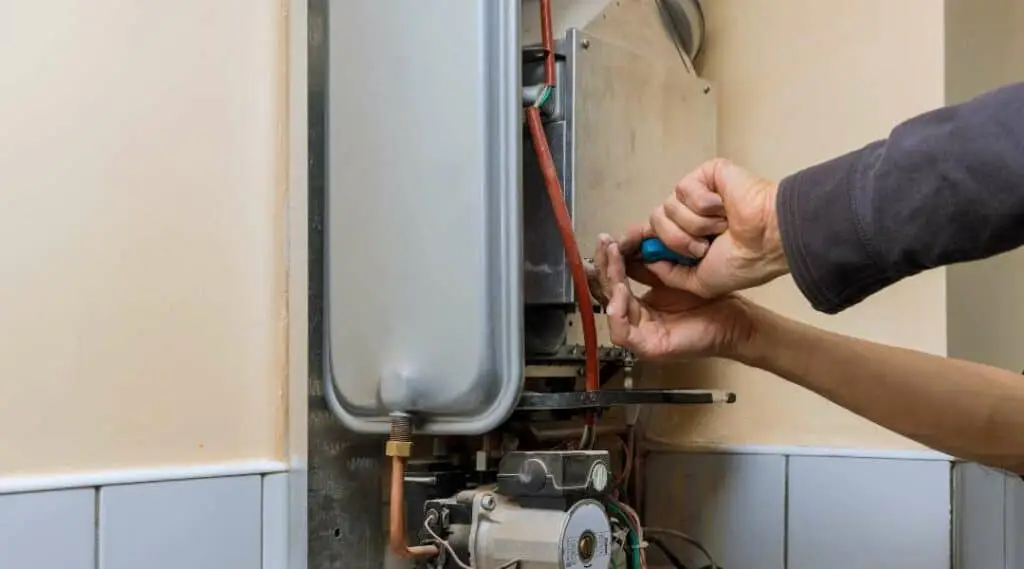DIY water heater repairs are risky for Santa Rosa residents since they can lead to leaks, gas hazards or electric shocks. Most home water heaters employ intricate components and high voltage connections that require professional attention. Attempting to repair components or replace wiring without the proper expertise can result in scalds or severe property damage. Santa Rosa’s local codes establish strict safety and equipment inspections. When you skip these steps you break the law or void warranties. Most insurance plans won’t cover damage from DIY home repairs. To keep homes safe and costs low, it pays to understand why water heater work is best left to trained pros. The following section examines key risks more closely.
Key Takeaways
- DIY water heater repairs multiply the chances of gas leaks, carbon monoxide, water damage, fire hazards and scalding burns which threaten safety and property.
- Santa Rosa has some of the strictest building codes in the United States ranging from seismic straps, permitting and venting–you want to have it all right or you may face legal penalties or fines.
- Local issues like hard water and earthquakes necessitate specific care and repair practices, meaning professional knowledge is especially important in this area.
- Most insurance policies exclude coverage for damages caused by unlicensed/unpermitted DIY repairs, so this could lead to denied claims and greater personal liability in an accident.
- The short-term cost savings of DIY repairs are quickly overshadowed by the long-term expenses of repeat repairs, emergency call-outs, and possibly a drop in property value.
- Trusting skilled technicians guarantees precise diagnostics, correct equipment, compliance with safety standards, and warranty coverage, ultimately protecting your investment and safety.
The Dangers of DIY Water Heater Repair
DIY water heater repair carries genuine dangers, specifically for people who are not experienced dealing with gas, water, or electrical systems. Although some jobs — such as a tank flush or valve test — are straightforward, the majority of repairs require technical expertise. These errors can result in injuries, property damage, or even worse. Here are the primary risks to remember.
- Gas leaks can threaten lives — through fires, explosions, or poisoning.
- Carbon monoxide is an invisible assassin, created when fuel-burning heaters are repaired incorrectly.
- Water damage means mold, rot and costly repairs.
- Fire dangers increase if repairs aren’t done by code.
- You can sustain scalding burns from high water temperatures or from failed parts.
- You’re exposed to chemicals if you don’t have the proper safety measures.
- Winter breakdowns can mess up your life, making repairs that much more hazardous.
- Repeat errors and additional expenses are the usual reward for DIY neophytes who dare to tackle complicated projects.
Gas Leaks
Gas leaks are one of the most important threats. Experiencing the odor of gas, a hissing noise, or observing dying plants around pipes can indicate a leak. If you have a gas water heater, never stop the airflow in the room, even in routine inspections. The improper tools, such as a standard wrench on a gas line, can scar fittings. Any indication of trouble with gas should be immediately reported to local safety agencies to minimize additional damage.
Carbon Monoxide
Carbon monoxide detector is a must in any home with a gas appliance. Even if you don’t have a poison, knowing the signs—headache, nausea, dizziness—can save lives. Those DIY jobs can leave gaps or loose fittings that allow this gas to accumulate unnoticed. Routine inspections by trained pros ensure systems are closed and functioning properly.
Water Damage
Leaks are tricky to detect, but even a slight drip can destroy walls or floors. Using the incorrect tape or sealant allows leaks to resurface, causing mold. Water can sag beams and cause latent damage. Immediate steps, such as turning off the main valve and drying the floor, reduce expense.
Fire Hazards
Keep combustibles away from the heater. Faulty wiring or loose plugs can cause fires. Inspect for burn marks or strange odors frequently. Heed to the manufacturer’s manual.
Santa Rosa’s Strict Building Codes
Santa Rosa’s strict building codes keep homes and buildings safe, especially in earthquake and wildfire-prone areas. They’re specific, addressing everything from the materials used to build to how owners must maintain their properties. Failure to comply with these rules can lead to fines, legal trouble and even difficulties when selling a home. For anyone planning repairs, knowing the rules and checking with local resources is key.
Seismic Straps
They require seismic straps to prevent water heaters from falling during an earthquake. These straps need to be installed per local code — that is, at the proper height and attached to a sturdy wall. Santa Rosa has specific guidelines regarding the kind and durability of straps needed since it’s located in an earthquake zone. Some folks use straps that are too weak or improperly installed, which can get you a fine or failed inspection. Be sure to inspect any old straps and replace ones that are rusted or broken. Inspectors will seek out these details during routine inspections.
Permitting Rules
Permits for simple water heaters? You bet. Permits ensure that any repair or install is up to safety and structural codes. Without the appropriate permit, homeowners face a fine, and if they go to sell the house down the line, the unpermitted work may need to be redone. The city utilizes permits as a means to track repairs and updates. Some consider the process to be cumbersome or expensive, but it safeguards long-term investment and safety. Consult Santa Rosa’s building department to confirm requirements.
Venting Codes
Gas water heaters need to be properly vented. Without it, hazardous gases such as carbon monoxide can accumulate inside a home. Santa Rosa’s Venting Codes
Santa Rosa’s strict building codes Homeowners must utilize appropriate materials and keep vents free of obstructions. Inspectors scrutinize these systems, and inadequate venting can equal quick citations. We are trained professionals, we know the codes and install systems that pass inspection and safeguard health.
Local Resources
Local guides and the city’s web site provide assistance for knowing what is required. Building departments have people to answer questions. Don’t ever guess—ask.
Why Your Insurance May Not Cover You
Water heater fixes feel like no-brainers to do yourself, but obviously insurance for DIY jobs is not that simple. Our concern is the risk of policy exclusions, denied claims and liability issues that can leave you open to material costs, particularly in jurisdictions with rigorous building codes and insurance regulations. Scrutiny and continued conversation with your insurer is required to prevent yourself from an expensive shock after a DIY fix turns awry.
Policy Exclusions
In fact, most home insurance policies specifically exclude damages that were caused by improper installation, neglect, or unauthorized repairs. If you DIY a water heater and omit things like venting, level placement or correct clearance, your insurer might deny coverage should an issue occur down the road. Policies usually exclude claims pursuant to devices that weren’t installed by a licensed professional or don’t have permits as mandated by your local code. That implies that even a minor lapse — like forgetting a permit or placing the heater in the incorrect location — might negate your coverage. Wear and tear, corrosion, and old units are popular exclusions, as insurance isn’t intended to cover breakdowns that come with age or regular use. Skimming your policy language once in a while keeps you informed on shifts, and quizzing your provider specifically about DIY exclusions is savvy.
Denied Claims
A post-accident denied claim can be financially crippling. DIY repairs, particularly those without documentation, are a common reason for insurance denials. Insurers may request maintenance records, professional inspections or repair receipts. Without these, it’s hard to establish your case if a claim pops up. Professional documentation—such as an invoice or an inspection report—is more influential and can assist in maintaining your coverage. It’s useful to check with your agent before beginning repairs, to determine what documentation or evidence your insurer requires for water heater claims.
Liability Issues
DIY water heater repairs don’t just jeopardize your own property coverage, they can open you up to liability if your repair work somehow harms someone else or destroys a neighbor’s property. There can be legal consequences as well if you violate local codes or bypass permits, as your insurers may not defend you in court or pay damages. For instance, if you put a heater in a location with poor ventilation, it could spark a fire or gas leak, and you can be held liable for injuries or property damage. Lawsuits and out of pocket expenses can quickly pile up. Knowing your local laws and always erring on the side of safety are crucial for any homeowner.

The Hidden Financial Costs
DIY water heater repairs sound like a bargain, but the hidden financial costs are prevalent. When you balance the short-term savings against the long-term costs, the calculus becomes more complicated. Below is a checklist comparing DIY and professional repair costs:
- Upfront expenses (tools, parts, time)
- Increased risk of repeat repairs
- Higher emergency service fees
- Lower property value from improper work
Repeat Repairs
DIY Repairs Can Cause Repeated Breakdown That Drive Up Costs Comparing the numbers:
Repair Type | Immediate Cost | Long-Term Cost (Year) | Total Over 5 Years |
DIY | $70 | $100–$300 | $570–$1,570 |
Professional | $200–$350 | $0–$50 | $200–$600 |
Never-ending patch-ups are maddening and chew through your budget. Each time you patch, you run the risk it returns, especially when it comes to finicky appliances like water heaters. Before you know it, what seemed like a tiny saving becomes an ongoing expense treadmill.
Opting for quality repairs breaks the cycle. Once you pay a pro, it could be years without worry, while DIY means paying again and again.
Emergency Fees
These types of DIY repair mistakes can leak or fail, creating desperate situations. Most emergency plumbers will charge you more, frequently 1.5 – 2X their normal fees.
If you have to make an emergency call after hours, plan on paying not just for the repair but for the immediacy of the service, as well as travel time and after hours labor. These additional fees can soon negate any upfront savings of DIY, often running 200–400 dollars a visit.
Investigate local emergency service prices prior to initiating the fixes. Factor these potential expenses into your choice, as they can put unanticipated pressure on your budget.
Property Value
Shoddy fixes can scar your walls or create concealed issues — both decrease your home’s worth. Buyers like to inquire about repair history and can lose faith when they encounter patchy craftsmanship or novice handyman solutions.
Homes with a history of professional maintenance sell quicker and for more money. DIY repairs can make buyers skittish and they’ll hand over less or flee. The impact endures for years both in terms of immediate comfort and long term resale.
Hiring certified experts keeps your property in tip top shape and assists you in maintaining or increasing its value.
The Professional Advantage
Professional services for water heater repairs — fewer errors, more safety and savings over time. Technicians have the right training and experience to identify problems fast, utilize appropriate tools, and provide warranties that safeguard your property and budget. Partnering with professionals assists in providing peace of mind by keeping warranties intact and your system operating effectively, contributing to property value retention.
Proper Diagnosis
As with any good repair, proper diagnosis comes first. Experts can distinguish a small issue from an indicator of larger difficulties. As an example, rusty or smelly water might sound minor, but it could indicate more serious issues with your heater’s tank or connections. If you misread these signs on your own, you could attempt fixes that don’t solve the underlying reason — wasting time and money. Experienced technicians leverage their expertise to diagnose every potential trouble source, ensuring nothing slips through the cracks.
A misdiagnosis can quickly result in do-over repairs or worse, bigger breakdowns. Seasoned pros perform complete evaluations, identifying problems early so they can be addressed before doing more harm.
Correct Tools
Having the proper tools is crucial for safe and effective water heater repairs. They bring a complete arsenal of specialized tools for specialized heater models and issues. If you attempt to use primitive household elbows or ghetto-fab snips, you run the risk of smashing bits or exacerbating the issue, potentially creating leaks or health hazards. Though quality equipment can be bought for DIY, most discover it’s not worth the additional expense to own it only for infrequent use.
Guaranteed Work
One of the best perks of using the pros is the service guarantee. Most vetted technicians provide transparent warranties on their work, including labor and parts. That’s right, you receive the backup if the repair doesn’t hold — at no additional charge. Warranties preserve manufacturer guarantees, as lots of DIY fixes void them. Having work performed by someone who backs their repair work provides you peace of mind and economic safety.
Added Value
Professionals have robust supplier networks that can accelerate repair. Their timely service satisfies tenants and maintains property value. Routine professional care prevents constant breakdowns, so it’s a wise long-term investment.
Conclusion
Local codes here establish a high threshold. Take one step wrong, and you risk penalties or worse. The area’s ground shifts and water problems create even greater danger that most people don’t realize. A number of insurance policies reject claims if repairs aren’t up to code or use the appropriate parts. The error bill racks up quickly. Partnering with a pro protects your home, your wallet, and your peace of mind. Get it right from the beginning. Protect your house and your sanity—call a licensed tech before you make a move. Your safety and your budget count.
Frequently Asked Questions
1. Why is DIY water heater repair considered dangerous?
DIY repairs can result in gas leaks, electric shocks, or water damage. Without 100% the right skills, wrongs can result in injuries or damage to your property.
2. Are there special building codes for water heaters in Santa Rosa?
Yes. Santa Rosa adheres to rigid codes. Unlicensed repairs could break these rules, resulting in fines or forced replacements.
3. How can local environmental factors in Santa Rosa increase repair risks?
Santa Rosa’s climate and earthquake activity call for unique installation and repair techniques. Neglect these and you risk leaks or system failure.
4. Will my home insurance cover damages from DIY repairs?
99% of policies don’t cover damages from unlicensed repairs. Which can cost you thousands in out of pocket repairs.
5. What hidden costs can result from DIY water heater repairs?
Shoddy repairs can lead to more serious issues over time. You might incur higher utility bills, additional repairs, or even replacement costs.
6. What are the benefits of hiring a professional for water heater repair?
They guarantee their repairs are up to safety codes and manufacturer standards. Their work is safer, dependable and frequently guaranteed.
7. Can DIY water heater repairs affect appliance lifespan?
Yes. Incorrect repairs can decrease the system’s efficiency and lifespan, resulting in replacement more often.
Get Reliable Water Heater Service in Santa Rosa — Fast, Honest, and Local Help Is Just a Call Away
Don’t let a faulty water heater disrupt your comfort another day. Whether you’re dealing with cold showers, inconsistent water temps, or a unit that’s completely shut down, the team at Yorkshire Plumbing & Drain Services is here to help. We provide fast, affordable, and honest water heater repair and installation services throughout Santa Rosa and nearby areas. With nearly a decade of hands-on experience, we know exactly how to restore your hot water and peace of mind.
Need help now? Call or message us today to schedule your no-cost estimate. We’re proud to offer same-day service when possible and are always ready for urgent jobs. Visit our Contact Page or give us a call — our local, family-owned team is standing by to get your hot water flowing again.
Disclaimer
The information provided on this website is for general informational and educational purposes only and is not intended as professional plumbing or construction advice. You should consult with a licensed plumber or qualified contractor for guidance specific to your home or situation. Do not rely solely on the content of this site to make decisions about plumbing repairs, installations, or maintenance. While we strive to keep the information current and accurate, it may not reflect the most recent industry standards or code requirements. Yorkshire Plumbing & Drain Services disclaims all liability for any actions taken or not taken based on the content of this site, to the fullest extent permitted by law.






